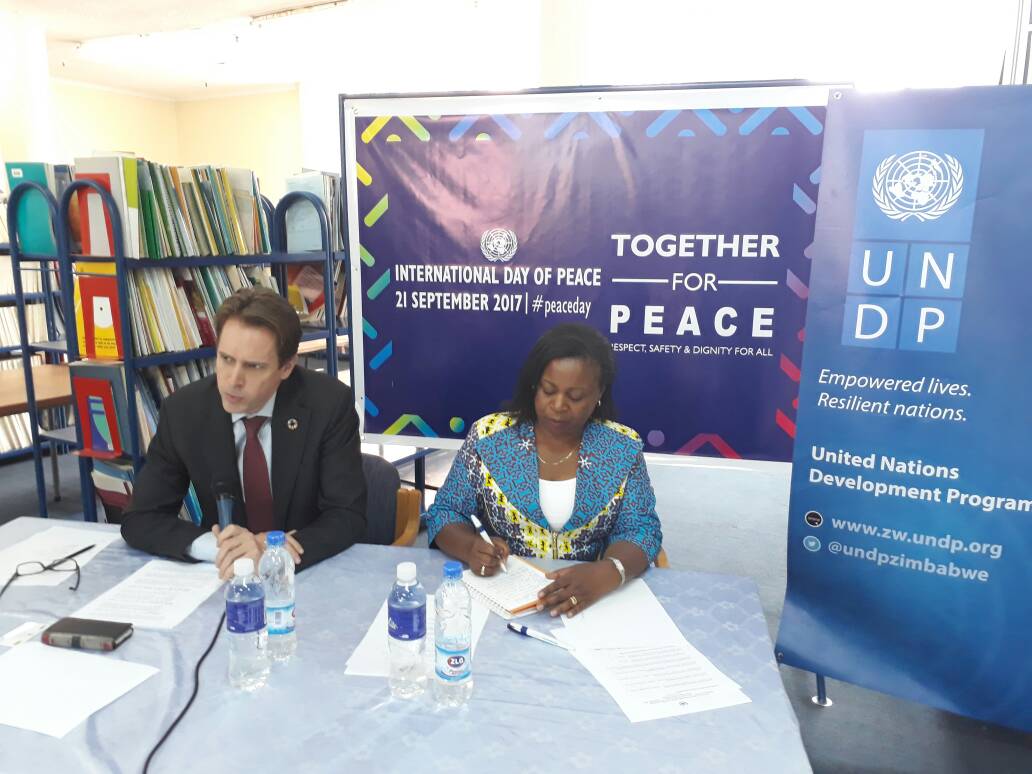By Byron Mutingwende
Peace is the foundation for progress and wellbeing and everyone has a duty to promote peaceful co-existence, Georges Van Montfort, the United Nations Development Programme (UNDP) Country Director of Zimbabwe has said.
Montfort made the remarks in Harare on Wednesday 27 September 2017 at the United Nations Information Centre during the belated commemoration of the International Day of Peace, observed around the world on 21 September.
“What is the importance of marking the international day of peace here, one may wonder. I would like to respond to that question by quoting one of our young Zimbabweans who participated in the Social Good Summit that UNDP hosted last week: “to me, no peace is not about war zones or violent extremism, it is when a father and son or a mother and daughter don’t talk.”
“As simple as the statement is, it is a profound thought that recognises the value of dialogue and respect for one another in whatever the circumstances, no matter our differences. And for me that brings the discussion on the importance of peace to each and every country and to each and every community,” Montfort said.
He said peaceful societies are not those that are devoid of conflict and underscored the fact that peace is sustained when individuals or communities have spaces to dialogue and can negotiate their lives while respecting the diverse interests of others.
“In fact, conflict is a key aspect of human existence and if well managed, can lead to positive transformation at individual and societal level.”
The senior UN official said expanding the opportunities for tolerance and promoting peaceful co-existence is a core investment towards the achievement of the Sustainable Development Goals and is even recognised as a specific goal, that is, Goal 16.
He highlighted some of the support that UNDP is providing to Zimbabwe towards the sustaining peace agenda. The UN agency provides technical and advisory services to enhance the capacity of national and community-level institutions mandated to promote peace, prevent conflict and facilitate healing and reconciliation. It does that through the Targeted support to the National Peace and Reconciliation Commission. In collaboration with Parliament, public hearings on the National Peace and Reconciliation Commission bill were supported to allow for citizen input into the legislation. Capacity building interventions for NPRC Commissioners are underway as part of its preparatory support – pending the passing of the Bill.
It also has a strategy for enhancing conflict prevention and peace building efforts at community level. The UNDP supports local mechanisms and approaches through partnerships with Faith-based organisations, Religious and Traditional Leaders, Local Authorities and Community Based Organisations to complement formal dispute resolution processes. It also provides targeted support for sustained dialogue on how to expand the space for young women and men’s participation in peace building processes.
The UNDP supports brokering learning and knowledge partnerships through South-South Cooperation to enhance the capacity of peace actors.
“As in most aspects of our work UNDP seeks to promote dialogue and the exchange of ideas and perspectives to help Zimbabwe and Zimbabweans design and implement policies that advance development. It is through this meeting of minds that development challenges can be dissected so that we understand the root causes from the various perspectives. Similarly, co-designing solutions provides almost a guarantee that implementation will be done jointly with involvement of the communities and hence, we stand a better chance of making a difference in people’s lives.
“As such, peace – and in particular the promotion of dialogue and respect – is as important in Zimbabwe as it is in any country, which is why we have taken the time to mark the International Day of Peace with you today and throughout these past days in the various events,” Montfort added.
